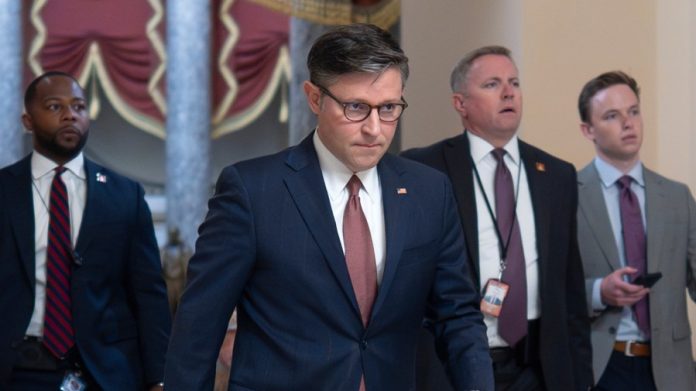
The fatal shooting of conservative activist Charlie Kirk is spurring calls in Washington for additional funding for lawmakers’ security as the deadline to reach a government funding deal quickly approaches.
Members on both sides have expressed security concerns in wake of the shooting, which comes as fears over political violence have been on the rise.
“We’re in a deliberate review process right now to determine what measures are appropriate, how much we could allocate for that,” Speaker Mike Johnson (R-La.) told reporters on Thursday. “We’ve got to protect people who run for public office or no one will, and that’s heavy on our hearts and minds.”
With less than three weeks standing between the Congress and a Sept. 30 government shutdown deadline, some lawmakers said Thursday that they believe member security should be part of the spending debate.
Rep. Ro Khanna (D-Calif.) said “I do,” when pressed on the matter. Rep. Bennie Thompson (D-Miss.) also agreed, saying, “I don’t know what House Administration, the Speaker and other folks are going to do, but I think every precaution that can be made should be afforded members.”
But other members have been skeptical that more funding is the answer.
Rep. James Comer (R-Ky.) noted that the shooter who killed Kirk was said to be 200 yards away and wondered whether any amount of security, short of a presidential-level Secret Service detail, could have prevented it.
“He could have had 30 security guards and no one would have seen a guy on a roof. That’s a Secret Service kind of thing, with drones,” he said. “You can’t spend enough money to have security like that.”
The debate comes as the House has made a push this week to formally conference a batch of full-year funding plans for fiscal year 2026, including the annual legislative branch funding bill.
The measure is traditionally the smallest of the 12 annual funding bills and was prioritized for a bicameral conference, as top appropriators have looked to make progress on the less thorny proposals ahead of the Sept. 30 shutdown deadline.
But increased concern over members’ safety in wake of a series of attacks on political figures in recent months could shine a brighter light on the bill in the weeks ahead.
Rep. Jesús “Chuy” García (D-Ill.) didn’t hesitate when asked if members should get more security: “Without a doubt. And I think there’s general agreement across the aisle.”
This month? He added, “It could, and I think it should.”
Rep. Lisa McClain (R-Mich.) agreed on the issue, saying, “I hope so. I really and truly do.” She also noted that last year, there were 9,000 recorded threats against members. This year, there have already been 14,000.
House Appropriations Chair Tom Cole (R-Okla.) said Thursday that it’s “too soon” to how growing concern over members’ safety will weigh on funding talks for House operations.
“We’re trying to come to common agreement on both the [continuing resolution] and, hopefully, we can attach some bills,” he told The Hill. “We don’t know if that’s possible yet, but that would be a very good sign for the country, if we could do something positive in the wake of all this.”
House Republicans could also soon release text for a stopgap funding bill, also known as a continuing resolution, to keep the government open on Oct. 1 and buy time for lawmakers to hash out funding plans for fiscal 2026. Cole has said the hope is to see floor action next week.
Asked Thursday if additional funding for members’ security could make the cut as part of the forthcoming stopgap plan, Cole suggested Thursday that the matter is one for leadership to address.
“I don’t know. I mean, obviously things have dramatically changed since yesterday’s tragedy,” he said. “I would think that would be a discussion between the two leadership teams. We’ll do whatever they ask us to do.”
Johnson said Thursday that a “very thorough review” is being conducted of “existing options” as well as enhancements to ensure members’ safety, but he also noted potential costs.
“We’ve seen estimates that if you provided a complete, full security detail, as it’s known, to every 435 members of the House, I mean, it would cost billions of dollars,” he said. “And we’d have to hire about 5,000 additional federal police.”
“So, I mean, that’s not, it’s not even a possibility,” he said. But he added, “We’re looking at all angles.”
He pointed to a pilot program launched last month that included additional funding for the members’ Residential Security Program, which included an increase for “monitoring and maintenance” allotments through late September that could also be used for personal security services.
Johnson said the program allows members to hire “personal security when they’re on the road or doing events in their district.”
A Republican staffer familiar with the program told The Hill on Thursday that a notice regarding the initiative was also sent to members’ staff in light of the Wednesday shooting.
“Surprisingly, it was not heavily taken advantage of during the August district work period,” they said.

